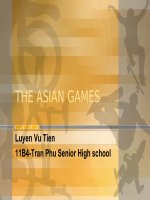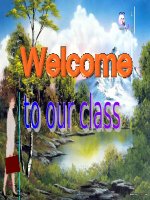UNIT 12 THE PRESENT PERFECT doc
Bạn đang xem bản rút gọn của tài liệu. Xem và tải ngay bản đầy đủ của tài liệu tại đây (92.17 KB, 7 trang )
UNIT 12: THE PRESENT PERFECT TENSE
I. Give the correct form of the following verbs.
1. (You, ever, be) ................................................to the United States?
2. Our teacher has promised (help) ……………………………… us to prepare for the exams.
3. I learned (ride)…………………….. the bike at the age of 5.
4. Try to avoid (make)………………………..a lot of mistakes in your thesis.
5. My best friend and I (know) _____________________ each other for over fifteen years. We
still get together once a week.
6. He (hear)……………the news, (go)………….to the telephone and (call)……………a friend.
7. What ____he (do) ______now? - He (water)_____________flowers in the garden.
8. What you (do/usually) ……………………………at weekend?
9. Peter (not/watch) __________________ much TV because he (prefer) ___________to read.
10. Since I began acting, I (perform)………………….in two plays, a television commercial and
a TV drama.
11. Laura never (win)………………………………a beauty contest.
12. He'd like (fly)…………………… an aeroplane.
13. All the members agreed (attend)……………………….the emergency
meeting.
14. While the parents (have)…………………. breakfast the children (run)…………….....about.
15. She (not / see)..............him for a long time.
16. They (visit)………………….a farm two weeks ago.
17. I am nervous about (make)……….. …… friends with her.
18. A: Did you like the movie "Star Wars?"
B: I don't know. I (see, never)_____________________that movie.
19. I_____________________ (read) a very interesting book now.
II. Choose the best answer.
1. Fish were among the earliest forms of life. Fish................on earth for ages and ages.
A. existed
B. are existing C. have existed
D. exist
2. I told her_______ about her wedding; everything will straighten out.
A. don't worry
B. not to worry
C. no worry
D. not worry
3. I have not read a newspaper since Sunday.
A. I never read a newspaper on Sunday. C. The last time I read a newspaper was on Sunday.
B. I only read a newspaper on Sunday. D. It is Sunday on which I read a newspaper.
4. May I suggest you let_______
A. Mary doing so
B. Mary do so
C. Mary does to
D. Mary to do so
5. The manager made his employees................. the computer evening class.
A. attending
B. attend
C. to attend
D. attendance
6. It was noisy next door. Our neighbors.............a party.
A. had
B. were having
C. had had
D. have had
7. She_______ him when he called her.
A. pretended not hear
B. pretended she heard not
C. pretended not to hear
D. did not pretend hear
1
8. The football match was wonderful at the beginning, …………….it was awful at the end.
A. but
B. and
C. or
D. so
9. John.............tennis once or twice a week.
A. usually play
B. is usually playing
C. usually plays D. have usually played
10. He left school three years ago.
A. It is three years since he had left school.
C. It is three years since he left school.
B. It is three years since he has left school. D. It has been three years ago since he left school.
11. I finally finished………..at 7 p.m. and served dinner.
A. cooking
B. being cooked
C. to cook
D. to be cooked
12. At 5 o’clock yesterday evening, I............…my clothes.
A. am ironing
B. have ironed
C. ironed
D. was ironing
13. These days, things have become more convenient; for example, you can buy airline tickets
at air agency,………..you can purchase them online.
A. yet
B. for
C. so
D. or
14. He fell down when he ............towards the church.
A. run
B. runs
C. was running
D. had run
15. I usually ............away at weekends.
A. have gone
B. goes
C. am going
D. go
16. My father has decided_______ a new house.
A. find
B. to find
C. finding
D. him find
17. John cannot make a ………… to get married to Mary or stay single until he can afford a
house and a car.
A. decide
B. decision
C. decisive
D. decisively
18. I.............along the street when I suddenly heard footsteps behind me.
A. was walking
B. am walking
C. walk
D. walked
19. She .............German for two years.
A. has learnt
B. is learning
C. learn
D. learns
20. Tina………….for London two years ago, and I…………from her since then.
A. left / have not heard
B. is leaving / had not heard
C. is going to leave / do not hear
D. leave / are not hearing.
21. ______ I was working in the garden, John was repairing the washing machine.
A. As soon as
B. Because of
C. While
D. Until
22. After I............…lunch, I looked for my bag.
A. had
B. had had
C. have has
D. have had
23. She has learnt English and French_________ the age of five.
A. since
B. for
C. before
D. in
24. ….............you go to the dentist?
A. how often are B. how often do C. how often does
D. how are
25. Can you tell me who is responsible …………... the finances in your family?
A. with
B. to
C. about
D. for
26. A healthy .....between work and play ensures that everyone has a chance to enjoy their lives.
A. balance
B. equality
C. share
D. control
2
27. The man got out the car ,............…round to the back and opened the boot.
A. walking
B. walked
C. walks
D. walk
28. Homestead High School's football team.......................a championship until last season.
A. has never won B. had never been winning C. is never winning
D. had never won
29. Look! That man….............to open the door of your car.
A. try
B. tried
C. is trying
D. has tried
30. They.............me about it last week.
A. was telling
B. told
C. had told
D. would tell
31. We............Doris since last Sunday.
A. don’t see
B. haven’t seen
C. didn’t see
D. hadn’t seen
32.. ……….. system is made up of our bones. It supports our body and protects our organs.
A. Circulatory
B. Digestive
C. Nervous
D. Skeletal
33. Oil ............if you pour it on water.
A. floated
B. floats
C. will be floated
D. float
34. Ann.............tea very often.
A. doesn’t drink
B. don’t drink
C. didn’t drink
D. hasn’t drunken
35. My grandfather............…many years ago.
A. had died
B. has died
C. died
D. was dying
36. The children have done .........,mopped, dusted, helped on the house and in the yard.
A. laundry
B. clothes
C. groceries
D. rubbish
37. Mr. Jones asks his wife to give up her job and stay home with the children.
A. Mr. Jones would like his wife to stop working and stay home.
B. Mr. Jones wants to quit his job.
C. Mr. Jones would like his wife to continue working. D. Mr. Jones wants to stay at home.
38. I haven’t seen him_________
A. many years ago
B. for many years ago
C. for many years D. since many years
39. Almost everyone............for home by the time we arrived.
A. leave
B. left
C. leaves
D. had left
40. Since............,I have heard nothing from him.
A. he had left
B. he left
C. he has left
D. he was left
41. My responsibility is to wash the dishes and .............the rubbish.
A. take up
B. get out
C. get up
D. take out
III. Read the following passage and mark the correct answer to each of the questions.
Music can be happy, sad, romantic, sleepy, spine-tingling, healing - all kinds of things.
But what is it? Some people define it as an artful arrangement of sounds across time. Our ears
interpret these sounds as loud or soft, high or low, rapid and short, or slow and smooth. The
sounds need to continue for a time in some sort of pattern to become music.
Music, like language, is a uniquely human form of communication. As with language, there are
many different kinds. In North America, people listen to jazz, rock, classical, folk, country, and
many other kinds of music. Each kind of music has its own rules and “speaks” to us in its own
way.
3
What we think of as music depends on where we live. What Americans are used to listening to
might sound strange to someone from another culture, and vice versa. It might not even sound
like music. In Indonesia, gamelan orchestras play music on gongs, drums, and xylophones.
These aren't the instruments you'd find in a typical orchestra in North America.
Today, modern communications make it possible for us to listen to music from all over the
world. Music from one part of the world influences music from another part. For example,
gamelan music from Indonesia influenced 20th-century American composers such as John
Cage.
No one knows for sure when music began. Perhaps while people were working, they began to
chant or sing to make the work go faster. People who were repeating movements - picking crops
or rowing boats, for example - could sing or chant in time to the work. Navajo Indians, for
example, had corn-grinding songs. Many cultures developed work songs.
Over time, people developed musical instruments. They might have started by clapping their
hands and stamping their feet. Sticks and objects that rattled could have replaced the human
body as early instruments. Both instruments and music became more complex with time.
Today, many cultures divide music into art music and music of the people. Art music, which we
call classical music, is more complicated than the music of the people - folk music and popular
music. Art music is generally harder to write and perform. Musicians who perform it need a lot
of training. Popular and folk styles typically are easier to create, perform, and understand.
1. Which of the following is given a definition in paragraph 1?
A. music
B. sounds
C. patterns
D. arrangement
2. The word "interpret" in the passage is closest in meaning to ____.
A. understand
B. refuse
C. treat
D. explain
3. What has enabled music of one nation to influence that of another?
A. Languages B. Modern communications C. Typical rules
D. Original instruments
4. Why is John Cage mentioned in paragraph 4?
A. To show how he has an influence on Indonesian music
B. To represent famous music composers in the 20th century
C. To illustrate how music from one region can influence that of another
D. To suggest that Indonesian music is related to American music
5. According to paragraph 5, why did people sing to chant at work?
A. To repeat the movements
B. To make the work go faster
C. To compose work songs
D. To make the work harder
6. The word "They" in the passage refers to ____.
A. hands
B. instruments
C. people
D. feet
7. The word "rattled" in the passage mostly means ____.
A. made mistakes B. done harms
C. made sounds D. done wonders
8. The word "complex" in the passage is closest in meaning to ____.
A. confusing
B. simple
C. advanced
D. comprehensible
9. Which of the following does the passage NOT discuss?
A. What music is
4
B. When music began
C. How music is categorized
D. Who composed the first song
KEY
X. Read the following passage and mark the letter A, B, C, or D to
indicate the correct answer to each of the questions.
Music can be happy, sad, romantic, sleepy, spine-tingling, healing - all
kinds of things. But what is it? Some people define it as an artful
arrangement of sounds across time. Our ears interpret these sounds as
loud or soft, high or low, rapid and short, or slow and smooth. The sounds
need to continue for a time in some sort of pattern to become music.
Music, like language, is a uniquely human form of communication. As
with language, there are many different kinds. In North America, people
listen to jazz, rock, classical, folk, country, and many other kinds of music.
Each kind of music has its own rules and “speaks” to us in its own way.
What we think of as music depends on where we live. What Americans
are used to listening to might sound strange to someone from another
culture, and vice versa. It might not even sound like music. In Indonesia,
gamelan orchestras play music on gongs, drums, and xylophones. These
aren't the instruments you'd find in a typical orchestra in North America.
Today, modern communications make it possible for us to listen to
music from all over the world. Music from one part of the world influences
music from another part. For example, gamelan music from Indonesia
influenced 20th-century American composers such as John Cage.
No one knows for sure when music began. Perhaps while people were
working, they began to chant or sing to make the work go faster. People
who were repeating movements - picking crops or rowing boats, for example
- could sing or chant in time to the work. Navajo Indians, for example, had
corn-grinding songs. Many cultures developed work songs.
Over time, people developed musical instruments. They might have
started by clapping their hands and stamping their feet. Sticks and objects
that rattled could have replaced the human body as early instruments.
Both instruments and music became more complex with time.
Today, many cultures divide music into art music and music of the
people. Art music, which we call classical music, is more complicated than
the music of the people - folk music and popular music. Art music is
generally harder to write and perform. Musicians who perform it need a lot
of training. Popular and folk styles typically are easier to create, perform,
and understand.
1. Which of the following is given a definition in paragraph 1?
A. music
B. sounds
C. patterns
D.
arrangement
Thông tin từ đoạn số 1, (Music can be happy, sad, romantic,
sleepy, spine tingling, healing - all kinds of things. But what is
5
2.
3.
4.
5.
6.
7.
6
it? Some people define it as an artful arrangement of sounds
across time.)
The word "interpret" in the passage is closest in meaning to ____.
A. understand
B. refuse
C. treat
D. explain
Suy từ ngữ cảnh của từ (Our ears interpret these Sounds as
loud or soft, high or low, rapid and short, or slow and smooth:
Tại chúng ta tiếp nhận âm thanh ở mức độ ...)
What has enabled music of one nation to influence that of another?
A. Languages
B. Modern communications
C. Typical rules
D. Original instruments
Thông tin từ đoạn 4 (Today, modern communications make it
possible for us to listen to music from all over the world. Music
from one part of the world Influences music from another part.
“sự giao tiếp hiện đại cho phép chúng ta nghe nhạc từ khắp
mọi nơi. Âm nhạc từ nơi này có thể ảnh hưởng âm nhạc tại nơi
khác").
Why is John Cage mentioned in paragraph 4?
A. To show how he has an influence on Indonesian music
B. To represent famous music composers in the 20th century
C. To illustrate how music from one region can influence that of another
D. To suggest that Indonesian music is related to American music
Thông tin từ đoạn 4 (For example, gamelan music from
Indonesia influenced 20th-century American composers such
as John Cage. - để minh họa/ ví dụ cho làm sao âm nhạc tại 1
vùng có thể ảnh hưởng âm nhạc tại vùng khác, xem đoạn 4,
dòng cuối)
According to paragraph 5, why did people sing to chant at work?
A. To repeat the movements
B. To make the work go faster
C. To compose work songs
D. To make the work harder
Thông tin từ đoạn 5 (No one knows for sure when music began.
Perhaps while people were working, they began to chant or
sing to make the work go faster. People who were repeating
movements - picking crops or rowing boats, for example could sing or chant in time to the work.)
The word "They" in the passage refers to ____.
A. hands
B. instruments C. people
D. feet
Hồi chỉ, (đại từ “they” có thể thay thế cho “people” hoặc
“musical instruments", nhưng khi xem nghĩa câu tiếp theo, “họ
bắt đầu bằng cách vô tay hoặc dậm chân", thì phải chọn
“people")
The word "rattled" in the passage mostly means ____.
A. made mistakes B. done harms C. made sounds
D. done
wonders
Suy từ ngữ cảnh (Over time, people developed musical
instruments. They might have started by clapping their hands
and stamping their feet. Sticks and objects that rattled could
have replaced the human body as early instruments. → making
sounds)
8. The word "complex" in the passage is closest in meaning to ____.
A. confusing
B. simple
C. advanced
D.
comprehensible
Suy từ ngữ cảnh (Over time, people developed musical
instruments. They might have started by clapping their hands
and stamping their feet. Sticks and objects that rattled could
have replaced the human body as early instruments. Both
instruments and music became more complex with time → bắt
đầu → thay thế → phát triển tinh xảo hơn, hiện đại hơn).
9. Which of the following is NOT TRUE according to the passage?
A. Music and language are forms of communication only used by
human beings.
B. People's locations can influence on their concept of music.
C. People developed musical instruments before they chanted at work.
D. Ordinary people may find art music hard to understand.
Thơng tin từ tồn bài (Music, like language, is a uniquely
human form of communication.; What we think of as music
depends on where we live.; Perhaps while people were
working, they began to chant or sing to make the work go
faster.; Art music, which we call classical music, is more
complicated than the music of the people - folk music and
popular music.)
10. Which of the following does the passage NOT discuss?
A. What music is
B. When music began
C. How music is categorized
D. Who composed the first
song
Bài đọc chỉ nói về âm nhạc nói chung, không đề cập tới các sản
phẩm âm nhạc như bài hát.
7









